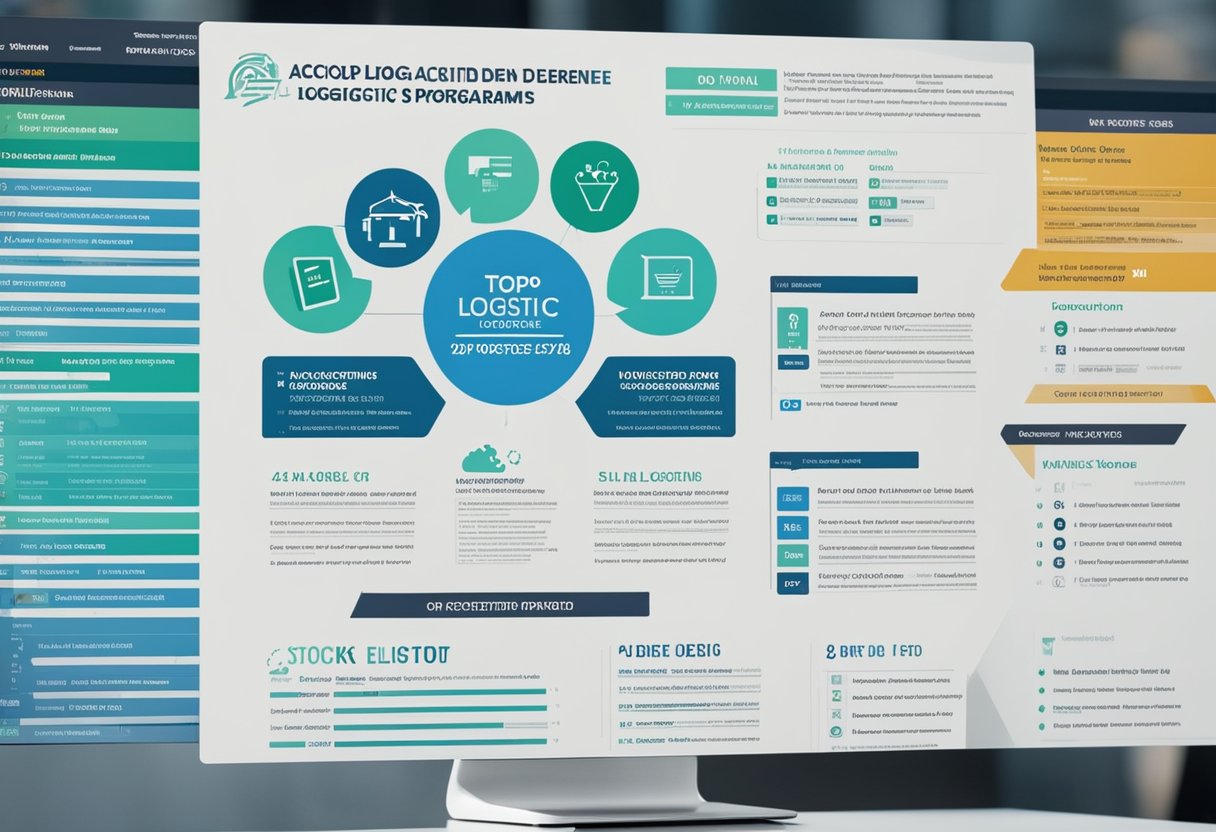Best Online Logistics Degrees of 2024: The logistics industry has been evolving rapidly in recent years, and the COVID-19 pandemic has only accelerated this trend. As a result, there is a growing need for professionals with the skills and knowledge to manage complex supply chains, coordinate transportation and distribution, and optimize logistics operations.
For those looking to advance their careers in this field, pursuing an online logistics degree can be a convenient and flexible option.
In this article, we will explore the best online logistics degrees of 2024. We have researched and evaluated various programs based on factors such as accreditation, curriculum, faculty expertise, student support, and career outcomes.
Whether you are a working professional seeking to upskill or a recent graduate looking to specialize in logistics, this guide will help you find the right program to achieve your goals.

Exploring the Top Accredited Online Logistics Degree Programs of 2024
Logistics and supply chain management are two closely related fields that are often used interchangeably. However, logistics refers to the process of planning, implementing, and controlling the movement of goods and services from the point of origin to the point of consumption. On the other hand, supply chain management encompasses the entire network of activities involved in the creation and delivery of goods and services to customers.
As the demand for skilled logistics professionals continues to grow, many universities are now offering online logistics degree programs to meet the needs of busy professionals. Here are some of the top accredited online logistics degree programs of 2024:
1. Penn State World Campus
Penn State World Campus offers an online Bachelor of Science in Supply Chain and Information Systems degree program that focuses on the integration of supply chain management and information technology. The program is designed to provide students with the skills and knowledge needed to manage complex supply chains in a global business environment.
2. Arizona State University
Arizona State University offers an online Bachelor of Science in Technological Entrepreneurship and Management degree program that includes a concentration in Supply Chain Management. The program is designed to prepare students for careers in logistics, procurement, and supply chain management.
3. University of North Texas
The University of North Texas offers an online Bachelor of Business Administration in Logistics and Supply Chain Management degree program that covers topics such as transportation management, inventory control, and global logistics. The program is designed to prepare students for careers in logistics, transportation, and supply chain management.
4. Florida Institute of Technology
The Florida Institute of Technology offers an online Master of Science in Logistics Management degree program that covers topics such as logistics strategy, supply chain management, and transportation management. The program is designed to provide students with the skills and knowledge needed to manage complex logistics operations.
Overall, online logistics degree programs offer a convenient and flexible way for busy professionals to advance their careers in the logistics industry. With the right skills and knowledge, graduates of these programs can pursue a wide range of career opportunities in logistics, transportation, and supply chain management.
Understanding Logistics: Scope and Career Prospects
What is Logistics?
Logistics is the process of planning, implementing, and controlling the movement of goods, services, and information from the point of origin to the point of consumption. The scope of logistics includes transportation, inventory management, warehousing, packaging, and security. Logistics is an essential part of any business that deals with physical goods, and it plays a crucial role in the success of the business.
Career Paths in Logistics
Logistics offers a wide range of career opportunities for individuals with different skill sets and interests. Some of the popular career paths in logistics include:
- Transportation Management: This involves managing the transportation of goods from one place to another. Transportation managers are responsible for selecting the best mode of transportation, negotiating rates with carriers, and ensuring timely delivery of goods.
- Inventory Management: This involves managing the inventory levels of a company. Inventory managers are responsible for maintaining the right level of inventory to meet customer demand while minimizing the carrying cost of inventory.
- Warehousing: This involves managing the storage and movement of goods in a warehouse. Warehouse managers are responsible for ensuring that goods are stored in the right place and are easily accessible when needed.
- Supply Chain Management: This involves managing the entire supply chain, from the point of origin to the point of consumption. Supply chain managers are responsible for coordinating the activities of different departments to ensure the smooth flow of goods and information.
Logistics is a growing field, and there is a high demand for skilled professionals in this area. According to the Bureau of Labor Statistics, employment in the logistics and supply chain industry is projected to grow by 7% from 2022 to 2032, which is faster than the average for all occupations.
What’s the difference between logistics and supply chain management? While logistics is focused on the movement of goods, supply chain management is focused on the entire process of getting goods from the point of origin to the point of consumption. Supply chain management includes logistics, as well as other functions such as procurement, production planning, and customer service.

Comparing Logistics and Supply Chain Management
Defining Supply Chain Management
Supply chain management involves the coordination of all activities involved in the production and delivery of goods and services from the supplier to the end customer. This includes everything from sourcing raw materials, manufacturing, transportation, warehousing, and distribution. The goal of supply chain management is to optimize the flow of goods and services, minimize costs, and maximize customer satisfaction.
Key Differences and Interconnections
Logistics, on the other hand, is a subset of supply chain management that focuses on the physical movement of goods and services. It involves the planning, implementation, and control of the movement and storage of goods and services from the point of origin to the point of consumption.
While logistics is a critical component of supply chain management, the two are not interchangeable. Supply chain management encompasses a broader range of activities and involves managing relationships with suppliers and customers, as well as coordinating the entire supply chain.
There are also several key interconnections between logistics and supply chain management. For example, effective logistics management can help to improve supply chain performance by reducing transportation costs, improving delivery times, and increasing customer satisfaction. Similarly, supply chain management can help to optimize logistics operations by ensuring that the right products are available at the right time and in the right place.
In summary, while logistics and supply chain management are closely related, they are distinct disciplines that require different skills and expertise. Both are critical to the success of any organization that produces and delivers goods and services, and a solid understanding of both is essential for anyone pursuing a career in the field of logistics and supply chain management.

Selecting the Right Online Logistics Degree
When considering an online logistics degree program, it is important to select a program that fits your needs and goals. Here are some criteria to consider when selecting the right online logistics degree:
Criteria for Selection
- Accreditation: Look for programs that are accredited by recognized accrediting bodies such as the Accreditation Council for Business Schools and Programs (ACBSP) or the Association to Advance Collegiate Schools of Business (AACSB). Accreditation ensures that the program meets rigorous academic standards and is recognized by employers.
- Curriculum: Look for programs that offer a comprehensive curriculum that covers key areas such as logistics management, supply chain management, transportation, and inventory management. The curriculum should also be up-to-date and relevant to the current industry trends and practices.
- Faculty: Look for programs that have experienced and knowledgeable faculty who have real-world experience in the logistics industry. Faculty members should also be accessible and responsive to students’ needs.
- Resources: Look for programs that offer resources such as career services, networking opportunities, and internship or co-op programs. These resources can help students gain valuable experience and make connections in the industry.
Financial Considerations
When selecting an online logistics degree program, it is also important to consider the financial aspects. Here are some financial considerations to keep in mind:
- Cost: Look for programs that offer a reasonable tuition rate and provide financial aid options such as scholarships, grants, and loans.
- Return on Investment (ROI): Consider the potential return on investment of the program. Look for programs that have a high ROI, which can be measured by factors such as job placement rates, starting salaries, and career advancement opportunities.
- Flexibility: Look for programs that offer flexible scheduling options such as part-time or accelerated programs. This can help students balance their academic and professional responsibilities while earning their degree.
Overall, selecting the right online logistics degree program requires careful consideration of various factors. By considering the criteria for selection and financial considerations, students can find a program that fits their needs and helps them achieve their career goals.





